九年级英语总会
仁爱英语中考九年级全一册知识点总复习整理版

仁爱英语中考总复习—---—-—---—-——-—知识点重点难点梳理(九年级上、下册)九年级(上)Unit 1Topic 1短语take photos 照相so…that 如此……以致于have /has been to 到过an English training school 一所英语培训学校在地take part in 参加 a disabled child 残疾儿童learn…from 从……学会around the world 全世界in the past 在过去in detail 详细地no chance 没机会make money 赚钱give support to 为某人提供帮助get a good education 得到好的教育have/has gone to 到过by the way 顺便问一下search the internet 上网used to be 去过曾经是with the development of China 随着中国的发展at sunrise 日出时grow cotton 种植棉花go hungry 变得很饿shout at 对…… 喊叫divide…into 把……分成send…to 把……送到…… at that time 在那时feel satisfied with 对……满意be used to do sth. 被用来做…… more than 超过during the vacation 在假期期间living condition 生活条件in recent years 在近几年make progress 取得进步live in present 立足现在dream about 展望未来happen to somebody/something ( 事情)发生在……身上,临到……头上happen to do something 碰巧thanks to 因为……,the capital of China中国首都host the 2008 Olympic Games 举办2008奥运会stand for 代表as well 也prepare for为…… 做准备taken place 发生with the help of 在……帮助下1.spend time (in) doing something 花费时间做某事2.see somebody doing something 看见某人做某事3.There goes the bell。
夜总会日常英语会话
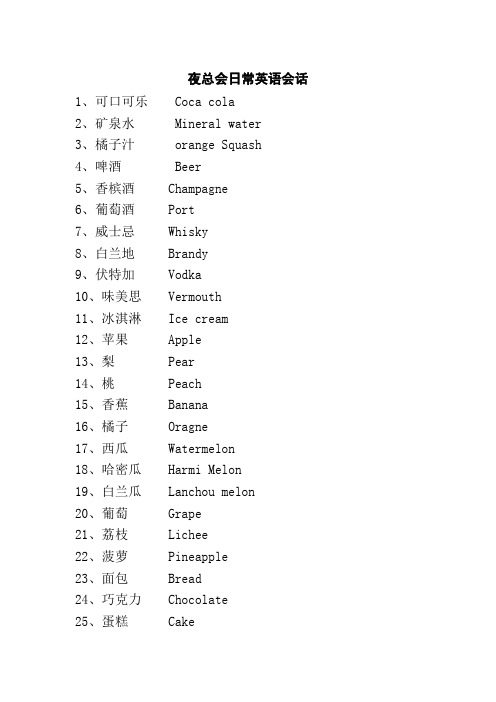
夜总会日常英语会话1、可口可乐 Coca cola2、矿泉水 Mineral water3、橘子汁 orange Squash4、啤酒 Beer5、香槟酒 Champagne6、葡萄酒 Port7、威士忌 Whisky8、白兰地 Brandy9、伏特加 Vodka10、味美思 Vermouth11、冰淇淋 Ice cream12、苹果 Apple13、梨 Pear14、桃 Peach15、香蕉 Banana16、橘子 Oragne17、西瓜 Watermelon18、哈密瓜 Harmi Melon19、白兰瓜 Lanchou melon20、葡萄 Grape21、荔枝 Lichee22、菠萝 Pineapple23、面包 Bread24、巧克力 Chocolate25、蛋糕 Cake26、咖啡 Coffee27、红茶 Black tea28、口布 A mouth Cloth29、香烟 Cigarette30、火柴 Match31、手纸 Toilet paper32、盘子 Plate33、叉子 Fork34、勺子 Spoon35、汤勺 Soup Spoon36、牙签 Toothpick37、筷子 Chopsticks38、茶杯 Cup39、开水 Hot water40、凉开水 Cold water41、甜 Sweet42、酸 Sour43、咸 Salty44、辣 Hot45、苦 Bitter46、糖 Sugar47、味精 Monosodium Glutamate48、咖喱粉 Curry Powder49、辣椒粉 Chilli powder50、胡椒粉 Black Pepper51、方糖 Cubic sugar52、砂糖 Powdered sugar53、香肠 Sausage54、服务员(男性) Waiter55、您好 Hi!56、您好! Hello!57、您好吗? How do you do?58、先生(女士),早上好。
仁爱英语中考九年级全一册知识点总复习整理版
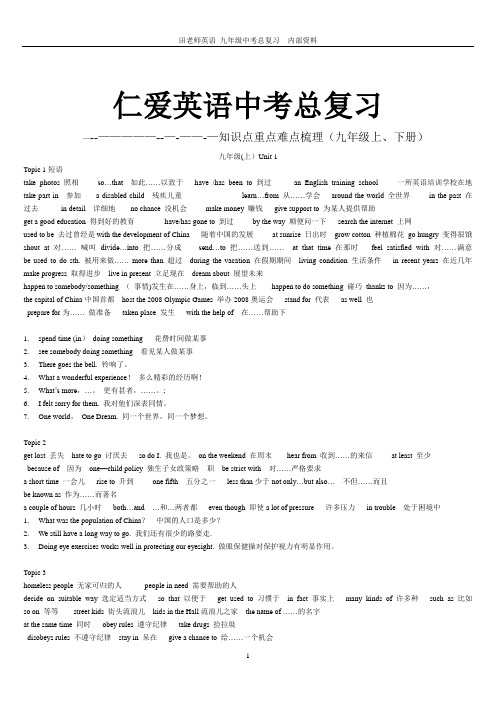
仁爱英语中考总复习—--—————--—-——-—知识点重点难点梳理(九年级上、下册)九年级(上)Unit 1Topic 1短语take photos 照相so…that 如此……以致于have /has been to 到过an English training school 一所英语培训学校在地take part in 参加 a disabled child 残疾儿童learn…from 从……学会around the world 全世界in the past 在过去in detail 详细地no chance 没机会make money 赚钱give support to 为某人提供帮助get a good education 得到好的教育have/has gone to 到过by the way 顺便问一下search the internet 上网used to be 去过曾经是with the development of China 随着中国的发展at sunrise 日出时grow cotton 种植棉花go hungry 变得很饿shout at 对…… 喊叫divide…into 把……分成send…to 把……送到…… at that time 在那时feel satisfied with 对……满意be used to do sth. 被用来做…… more than 超过during the vacation 在假期期间living condition 生活条件in recent years 在近几年make progress 取得进步live in present 立足现在dream about 展望未来happen to somebody/something (事情)发生在……身上,临到……头上happen to do something 碰巧thanks to 因为……,the capital of China中国首都host the 2008 Olympic Games 举办2008奥运会stand for 代表as well 也prepare for为…… 做准备taken place 发生with the help of 在……帮助下1.spend time (in)doing something 花费时间做某事2.see somebody doing something 看见某人做某事3.There goes the bell. 铃响了。
仁爱英语中考九年级全一册知识点总复习整理版
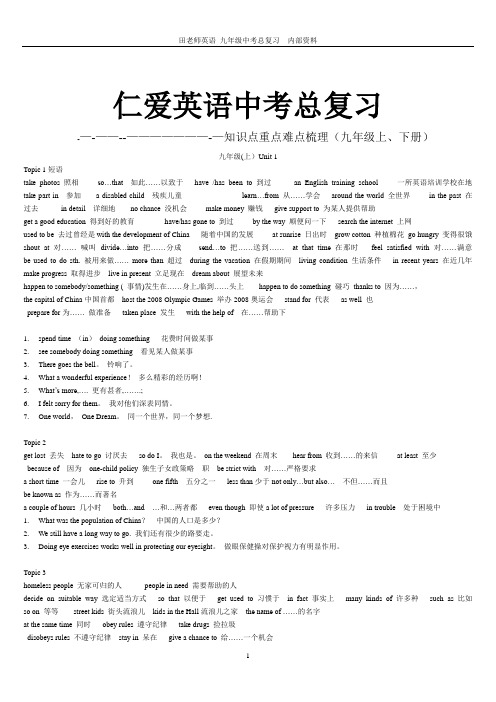
仁爱英语中考总复习-—-——--———————-—知识点重点难点梳理(九年级上、下册)九年级(上)Unit 1Topic 1短语take photos 照相so…that 如此……以致于have /has been to 到过an English training school 一所英语培训学校在地take part in 参加 a disabled child 残疾儿童learn…from 从……学会around the world 全世界in the past 在过去in detail 详细地no chance 没机会make money 赚钱give support to 为某人提供帮助get a good education 得到好的教育have/has gone to 到过by the way 顺便问一下search the internet 上网used to be 去过曾经是with the development of China 随着中国的发展at sunrise 日出时grow cotton 种植棉花go hungry 变得很饿shout at 对…… 喊叫divide…into 把……分成send…to 把……送到…… at that time 在那时feel satisfied with 对……满意be used to do sth. 被用来做…… more than 超过during the vacation 在假期期间living condition 生活条件in recent years 在近几年make progress 取得进步live in present 立足现在dream about 展望未来happen to somebody/something ( 事情)发生在……身上,临到……头上happen to do something 碰巧thanks to 因为……,the capital of China中国首都host the 2008 Olympic Games 举办2008奥运会stand for 代表as well 也prepare for为…… 做准备taken place 发生with the help of 在……帮助下1.spend time (in)doing something 花费时间做某事2.see somebody doing something 看见某人做某事3.There goes the bell。
九年级英语知识点归纳整理

九年级英语知识点归纳整理一、语法知识点。
1. 被动语态。
- 结构:一般现在时的被动语态:am/is/are + 过去分词;一般过去时的被动语态:was/were+过去分词;一般将来时的被动语态:will be+过去分词;含有情态动词的被动语态:情态动词+be +过去分词。
- 用法:当不知道动作的执行者是谁,或者没有必要指出动作的执行者时,使用被动语态。
例如:The bridge was built last year.(不知道谁建的桥,只强调桥被建好了)2. 定语从句。
- 关系代词:that,which,who,whom,whose。
that既可以指人也可以指物;which指物;who指人,在从句中作主语;whom指人,在从句中作宾语;whose表示所属关系,“……的”。
例如:I like the book which/that was written by Lu Xun.(先行词book是物,关系代词可用which或that);The boy who/that is standing there is my brother.(先行词boy是人,关系代词可用who或that作主语)- 关系副词:when,where,why。
when在定语从句中作时间状语;where作地点状语;why作原因状语。
例如:I still remember the day when I first met her.(先行词day表示时间,关系副词用when);This is the place where we used to live.(先行词place表示地点,关系副词用where)3. 宾语从句。
- 语序:宾语从句要用陈述句语序,即“连接词+主语+谓语+其他”。
例如:He asked me where I was going.而不是He asked me where was I going.- 连接词:that(无意义,可省略,在从句中不作成分);if/whether(“是否”,在从句中不作成分);特殊疑问词(如what,when,where,why,how等,在从句中作相应的成分)。
初中必背的英语作文句子摘抄
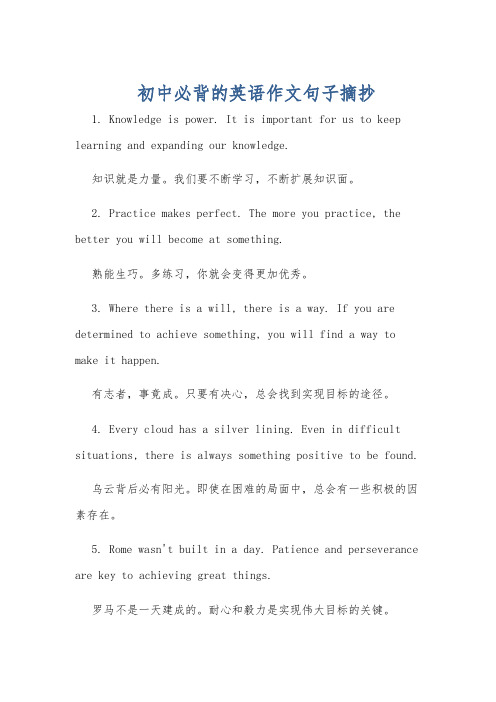
初中必背的英语作文句子摘抄1. Knowledge is power. It is important for us to keep learning and expanding our knowledge.知识就是力量。
我们要不断学习,不断扩展知识面。
2. Practice makes perfect. The more you practice, the better you will become at something.熟能生巧。
多练习,你就会变得更加优秀。
3. Where there is a will, there is a way. If you are determined to achieve something, you will find a way to make it happen.有志者,事竟成。
只要有决心,总会找到实现目标的途径。
4. Every cloud has a silver lining. Even in difficult situations, there is always something positive to be found.乌云背后必有阳光。
即使在困难的局面中,总会有一些积极的因素存在。
5. Rome wasn't built in a day. Patience and perseverance are key to achieving great things.罗马不是一天建成的。
耐心和毅力是实现伟大目标的关键。
6. Actions speak louder than words. It is important to show what you can do through your actions, rather than just talking about it.言行胜于言辞。
重要的是通过行动展示自己的能力,而不仅仅是说而已。
总会想起那句话英语作文满分

总会想起那句话英语作文满分Memories, like ripples in a tranquil pond, spread outwards from the depths of our minds, casting a faint shimmer on the surface of our present. They can evoke a kaleidoscope of emotions, from the bittersweet twinge of nostalgia to the radiant glow of joy. One particular memory, a fleeting phrase that whispered through the corridors ofmy childhood, has left an enduring imprint on my consciousness.It was during a summer evening, when the sun dipped below the horizon, painting the sky in hues of amber and gold. The air was heavy with the scent of blooming jasmine, carried by a gentle breeze that rustled through the leavesof the towering trees. I sat on the porch swing, envelopedin a tranquil reverie, as my grandmother's soft voicedrifted towards me.She was a woman of gentle wisdom and boundless love,her eyes twinkling with a mischievous spark that belied heradvanced age. As she sat in her rocking chair nearby, her nimble fingers worked deftly on a knitted scarf, her lips murmuring an old lullaby.Suddenly, she paused and turned to me, her gaze meeting mine. A serene smile spread across her face as she uttereda phrase that would forever become etched in my memory: "Remember, my dear, life is a tapestry woven with both joy and sorrow. Embrace it all, for it is in the tapestry's intricate threads that the true beauty lies."Her words, simple yet profound, resonated deep within me. At that moment, I understood that life was not merely a pursuit of happiness but an acceptance of the full spectrum of human experience. Joy and sorrow, triumph and adversity– these threads were inseparably intertwined, forming the vibrant tapestry of our lives.As I grew older, life's tapestry unfolded before me, presenting me with both moments of unbridled joy andperiods of profound sorrow. There were times when laughter filled the air and the world seemed alight with possibility.But there were also times when darkness enveloped me, and the weight of the world pressed heavily upon my shoulders.Yet, through it all, my grandmother's words served as a constant beacon, guiding me through the labyrinth of life's complexities. I learned to embrace the joys with gratitude and to navigate the sorrows with courage and resilience. For I knew that each thread, both bright and dark, contributed to the richness and depth of my tapestry.Over the years, I have shared my grandmother's wisdom with countless others, each time marveling at its timeless relevance. It is a message that transcends generations, offering solace in times of adversity and inspiring us to live our lives to the fullest, with both joy and sorrow woven into its intricate design.Like a cherished heirloom, I carry my grandmother's words close to my heart. They have become an integral part of my being, shaping my perspective on life and guiding me through its myriad challenges. And so, I shall continue to embrace the tapestry of life, with all its vibrant hues anddelicate threads, knowing that within its intricate design lies the true beauty of the human experience.。
九年级英语毕业会考知识点
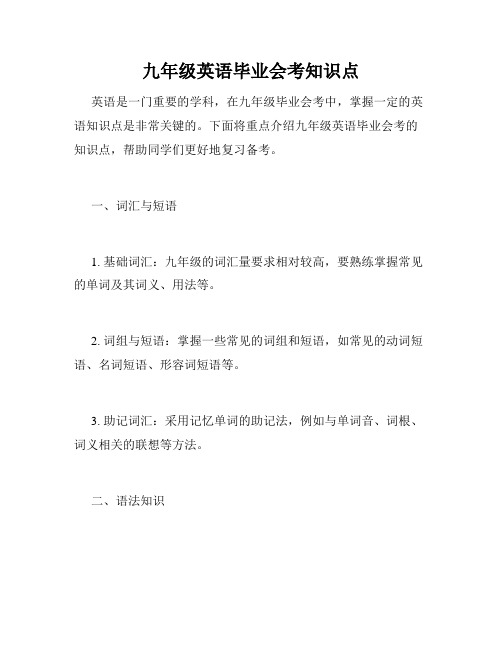
九年级英语毕业会考知识点英语是一门重要的学科,在九年级毕业会考中,掌握一定的英语知识点是非常关键的。
下面将重点介绍九年级英语毕业会考的知识点,帮助同学们更好地复习备考。
一、词汇与短语1. 基础词汇:九年级的词汇量要求相对较高,要熟练掌握常见的单词及其词义、用法等。
2. 词组与短语:掌握一些常见的词组和短语,如常见的动词短语、名词短语、形容词短语等。
3. 助记词汇:采用记忆单词的助记法,例如与单词音、词根、词义相关的联想等方法。
二、语法知识1. 时态与语态:九年级语法要求熟练掌握各种时态和语态的用法,包括一般现在时、一般过去时、一般将来时、现在进行时、过去进行时、现在完成时、过去完成时等。
2. 名词与代词:要掌握名词的单复数形式变化规则,如普通名词的复数变化规则,不能数的名词等。
了解代词的种类及其在句子中的用法。
3. 形容词与副词:要熟练掌握形容词和副词的比较级与最高级形式,以及其在句子中的用法。
4. 介词与连词:了解介词与连词的用法及常见搭配,例如时间介词、地点介词、方向介词、逻辑连词、并列连词等。
三、阅读理解1. 短文理解:九年级英语毕业会考中,常有一篇短文后跟几个问题,要求学生根据短文内容回答问题。
因此要提高对短文的理解能力,积累阅读理解的相关词汇和表达。
2. 阅读技巧:了解一些阅读技巧,如快速浏览短文寻找主题句、注意关键词、理解上下文的关系等。
四、写作技巧1. 句型与表达:学会使用一些基本的英语句型和表达方式,如否定句、疑问句、祈使句等,以及一些常用的表达方式,如表示原因、结果、对比、建议等。
2. 写作结构:了解一些常用的写作结构,例如五段式写作结构,包括引言、论点1、论点2、论点3、结论等。
3. 写作规范:注意语法的正确性、拼写的准确性以及书写的规范性,避免常见的语法错误和拼写错误。
五、听力训练1. 听力材料:通过听录音,理解所听到的内容,提高听力理解能力。
听力材料可以是对话、短文、新闻等形式。
- 1、下载文档前请自行甄别文档内容的完整性,平台不提供额外的编辑、内容补充、找答案等附加服务。
- 2、"仅部分预览"的文档,不可在线预览部分如存在完整性等问题,可反馈申请退款(可完整预览的文档不适用该条件!)。
- 3、如文档侵犯您的权益,请联系客服反馈,我们会尽快为您处理(人工客服工作时间:9:00-18:30)。
九年级全册英语复习资料◆Unit1 How do you study for a test?一.复习要点1.目标语言:talk about how to study,2.要求背诵部分P3G ,P4-3a, P6-3a, P8-reading3.背诵单词表。
1.4.复习教材全部内容,复习所做过的练习,着重基础题目。
二.词汇知识点:1.frustrate,frustrating,frustrated: frustrate意思为“使失望,使沮丧,使厌烦”,是及物动词,其后接宾语;frustrating意思为“令人沮丧的,令人失望的”。
是指某事使人失望,含有主动意义,主语一般为物;frustrated意思为“沮丧的,失望的”。
是指对某物感到失望,相当于disappointed,含有被动意义,主语一般为人。
短语be frustrated in意思为“遭受失败”。
2.介词by , with, in , on表方式: by+交通工具(注意不带冠词),by+doing sth通过…方式;with+工具,with a pen, with+人体部位,with our eyes;in +语言,in English, in+物质材料,in ink(墨水)=by pen;on+电器或媒介on TV 3.Ever的用法:ever相当于at any time,意思为“曾经”。
同义词为always,反义词为never.常见于现在完成时的一般疑问句及条件状语从句,其他情况下也有所使用。
1)用于现在完成时的一般疑问句中。
Have you ever been to Shanghai? 2)用于条件状语从句。
If you ever hear from her, please tell me about it.3)用于一般现在时的疑问句中。
Do you ever talk to your English friends?4)用于否定句。
No man ever returned from here.5)用于肯定句中,表示“常常,总是”,常使用always.注意:ever和always的反义词都是never。
Never意思为“从来不,从未有过“。
若一个陈述句中含有ever或always,变为否定句时直接用never改写即可。
4.get excited about相当于be/become interested in对…感到兴奋(有趣);5.end up终止,结束相当于finish.up.后接动词要用-ing形式.We didn‟t like it first,but we ended up cheering.开始我们并不喜欢它,但最后我们却为之欢呼。
为副词.up有“…完,…光”之意。
类似的短语还有finish up,eat up, burn up.give up.还有…朝上…的意思。
如look up ,stand up, get up, think up.6.speak, talk, say, tell这四个动词都与汉语中的“说”有关。
由于这四个词都有多种词义,用法和搭配,因而它们之间有相似之处,也有一定的区别。
Speak主要用作不及物动词,意思为“说话,讲话,演讲”。
它着重指开口发声,而且着眼于个人的言语行为。
它可于to , on , with, about, for , of , out, up等介词和副词搭配使用或构成动词短语。
Speak也可用作及物动词,但只能接“某种语言”,如Chinese, English, French, languages等,Speak不能用于转述,不能接直接引语或间接引语,不能跟that引导的宾语从句。
Talk也主要作不及物动词用,意思是“谈话,讲话”,与speak的意义很接近。
它可以指一个的言语行为,但着重指两个以上的人通过谈话交换意见,思想和信息,有较强的对答与讨论的意味。
Talk本身也着重说话的动作,而不着重所说的话。
Talk后接介词to或with 引出交谈对象,后接介词of或about引出谈及的事情。
Say主要用作及物动词,意思是“讲,说”,着重说的内容,可以用名词或从句作宾语,还常用于引出直接引语和间接引语。
say to oneself自言自语,心里想。
Say仅在少数情况下用作不及物动词。
Tell主要用作及物动词,意思是“告诉”,除接the truth, a story, a lie等少数词时为单个宾语外,一般接双宾语,其间接宾语通常为人,直接宾语既可以是名词短语也可以是从句,因此它可以接间接引语。
Tell有时可以表示“嘱咐”或语气较轻的命令,其句型为tell sb(not)to do sth叫某人(别)做某事。
Tell有时还有断定,识别,辨别的意思。
7.by mistake, mistake…for…,and no mistake, make no mistake: by mistake意思为“由疏忽,健忘等所致错”。
如,I took his umbrella by mistake.;mistake…for 表示“把…错认为…”如,She is often mistaken for her twin sister.;and no mistake 意思为“无疑地,的确”。
如,It is hot and no mistake.今天的确很热。
;make no mistake意思为“别弄错”。
如Now make no mistake!现在别弄错了。
8.complete, perfect: compete表示一个整体所需的各组成部分完整无缺,意思为“完全的;完整的;彻底的”。
;perfect强调完美的,十全十美的意义,常用来指对事物好坏程度的评价。
9.impressive, impression: impressive adj.给人深刻印象的;难忘的。
Impression n.印象。
10.Afraid的用法:be afraid of sth意思为“害怕某事或某物”;be afraid to do sth 意思为“害怕做某事”;be afraid of doing sth意思为“惟恐”,指担心或担忧会引起某种后果;be afraid that …意思为“恐怕….”;为某件已经发生或可能发生的事表示歉意或作出否定判断,相当于sorry。
这种说法显得更文雅,谦逊。
11.deal with, do with: deal with后面接名词或从句作宾语,也可用于被动语态中或用其不定式作定语。
意思为“处理,解决”时,主语通常是人或事。
意思为“与…打交道,与…做买卖”时,主语通常是人,公司,商店等;do with为动词短语,后接名词或that从句作宾语。
do with意思为“处理”时,常与what连用,以示询问处理的结果。
do with意思为“想要”时,常与can 或could 连用。
do with 意思为“与…有关”时,常与have to连用。
deal in意思为“与…做买卖”。
12.decide , make up one’s mind: decide指做出一定的选择,强调经过考虑或商议。
make up one‟s mind意思为“打定主意”,与迟疑,动摇,困惑相对。
13.as regards意思为“至于,关于”,一般位于句首,起介词的作用,后接名词,动词-ing或what 从句,表示叙述的内容。
三.句型。
1.目标语言:b y doing……表方式How do you studying for a test?I study by listening to tapes.2.Too…to,enough to: too…to结构中的动词不定式部分为否定意义;而enough to 结构意思为“足以能够”,是肯定意义,只有用于否定句中时,后面的不定式才是否定意义。
二者在一定条件下可以相互转换。
He is too young to dress himself.=He is not old enough to dress himself.他太小了而不能自己穿衣服。
还可以so…that…用替换此句。
He is so young that he can‟t dress himself.四.语法。
1.动词不定式:1)动词不定式的构成:to +动词原形;2)动词不定式的作用:作主语。
此时由于主语太长,常常后置,而用it作形式主语;作宾语。
常接动词不定式作宾语的动词有want, would like,begin, start,like, hope, wish, remember, decide,plan等;作表语;作状语;作宾语补足语;作定语。
作定语的动词不定式和所修饰的词之间有着逻辑上的主谓关系,所以不定式中的动词必须是及物动词。
3)疑问词加动词不定式:a)构成:what, which, how , when, where等疑问代词或疑问副词,后面几个一个动词不定式或动词不定式短语。
b)作用:按所作的句子成分来说,在句子中一般可以作主语,宾语和表语。
如How to save the child is the most important to us. (作主语)I d on‟t know what to do next.(作宾语)The problem is when to start.(作表语);“疑问词+动词不定式”结构可以改写成由该疑问词引导的从句,从句所作的句子成分不变。
如I don‟t know what to do.= I don‟t know what I should do.4)动词不定式的否定式是在动词不定式前加not.5)动词不定式省略to的情况:在使役动词和感官动词后面的不定式,要省略to.hear ,see,make,have等。
但变成被动语态后由于原来的宾语提到前面做主语去了,就不能to省了。
如I saw him come by bike.—He was seen to come by bike.◆unit 2 I used to be afraid of the dark.一复习要点.1.目标语言:talk about what you used to be like 2.要求背诵:P14—3a, P16—reading3.背诵词汇表。
4.复习教材全部内容,复习所做过的练习,着重基础题目。
二:词汇知识点3.miss 的用法.1)。
动词错过,未赶上。
I was late because I missed the bus.我迟到是因为我没赶上车。
My house is at the end of the road,and you can‟t miss it.我的房子就在路的尽头,你不会看不到的。
